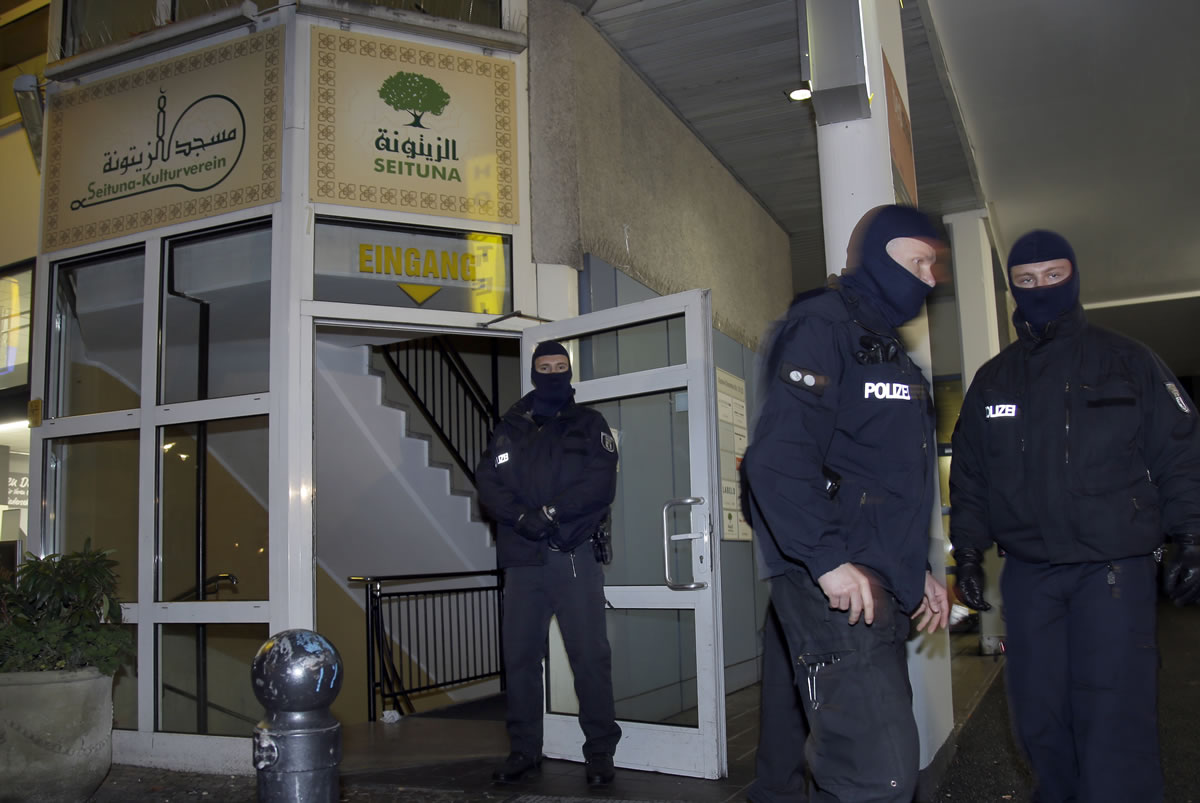MOSCOW — French President Francois Hollande called for forming a broad international coalition against the Islamic State group, using his visit to Moscow on Thursday to try to unite France, the U.S. and Russia on a response to the Paris attacks that killed 130 people.
IS has claimed responsibility for the Nov. 13 attacks in Paris, as well as deadly bombings in Beirut and the downing of a Russian airplane on Oct. 31 that killed all 224 people on board over Egypt’s Sinai Peninsula.
“We need to take the lead so that there can be actions against terrorism that must be intensified,” Hollande told Russian President Vladimir Putin at the start of their talks at the Kremlin.
“Terrorism is our enemy,” Hollande said. “We know it, it has a name: it’s Daesh, the Islamic State.”
Putin said that Russia was mourning for Paris victims and those who died in the downing of the Russian passenger plane over Egypt. He praised Hollande’s efforts to build an anti-terror coalition and said that Moscow was open for stronger cooperation.
Germany, meanwhile, has decided to send reconnaissance aircraft, tanker planes and a warship to help in the fight against IS.
Hollande’s visit comes two days after he met with President Barack Obama in Washington, where both leaders vowed to escalate airstrikes against IS and bolster intelligence sharing.
Hollande’s difficult task became even more arduous after Turkey shot down a Russian warplane near the Syrian border on Tuesday. The incident underscored the complex military landscape in Syria, where a sprawling cast of countries and rebel groups are engaged on the battlefield and in the skies overhead, sometimes with minimal coordination.
The French president hopes to make progress on three priority issues: to prevent Syrian President Bashar Assad from targeting civilians, to focus the airstrikes on IS militants — not the moderate Syrian opposition — and to move forward on a political transition in Syria.
France will also seek to “avoid an escalation” between Russia and Turkey, according to a French diplomatic official who spoke on condition of anonymity because of the sensitivity of the issue.
In advance of Hollande’s meeting with Putin, France sought to dismiss concerns that it might soften its stance on international sanctions against Russia over Ukraine in exchange for Russia’s cooperation in the fight against IS. France’s ambassador to the U.S., Gerard Araud, tweeted on Tuesday evening that “Hollande has confirmed the sanctions will be maintained as long as the Minsk agreements are not implemented.”
Araud was referring to peace agreements for eastern Ukraine forged in the Belarusian capital in February.
Following his meeting with the French president, Obama said Russian cooperation in the fight against IS would be “enormously helpful.” Both Obama and Hollande, however, insisted that a political transition in Syria must lead to Assad’s departure. Russia, on the other hand, has been Assad’s staunchest ally.
Last week, Hollande called for the U.S. and Russia to set aside their policy divisions over Syria and “fight this terrorist army in a broad, single coalition.” But his office acknowledges that “coordination” sounds like a far more realistic goal.
With two suspects of the Paris attacks at large, tensions were still high in Belgium on Thursday with the capital, Brussels. But authorities lowered the threat level in Brussels to the second-highest level.
Since Saturday morning, Brussels — home to the European Union and NATO headquarters — had been wary of a threat that was considered “serious and imminent.”
The lowering of the threat level came as a surprise, since the government had said that it would likely keep the highest threat level in the capital through the weekend.
Authorities launched a raid in southern Belgium on Thursday afternoon linked to the Paris attacks, but didn’t detain any suspects.
In Brussels, a civil protection squad decontaminated several people as a precaution at the main mosque after a suspicious parcel arrived. The person who opened the package discovered white powder and immediately contacted authorities. A specialized crew from the fire department was sent, witnesses at the scene said.
In Germany, Chancellor Angela Merkel’s Cabinet decided in the wake of the Paris attacks to send reconnaissance aircraft, tanker planes and a warship to help in the fight against IS. Defense Minister Ursula von der Leyen told reporters that the government had also agreed to provide satellite surveillance.
During Merkel’s visit in Paris on Wednesday, Hollande had said it would “be a very good signal in the fight against terrorism” if Germany could do more against IS in Syria and Iraq.
Von der Leyen said the warship would help protect France’s aircraft carrier in the eastern Mediterranean and the tanker planes could help refuel French warplanes in the air. The satellite surveillance could provide important information on IS and also help protect civilians with precise information.
The reconnaissance aircrafts will also support France in its fight against Islamist extremists.
Von der Leyen said that France had asked for help and that “the government has decided on these difficult, but important and necessary steps … with the awareness that we are firmly on the side of France.”
Germany currently provides weapons and training for Kurds fighting against IS in Iraq.
The decision still needs parliamentary approval, but it was expected to not meet much resistance by lawmakers.



